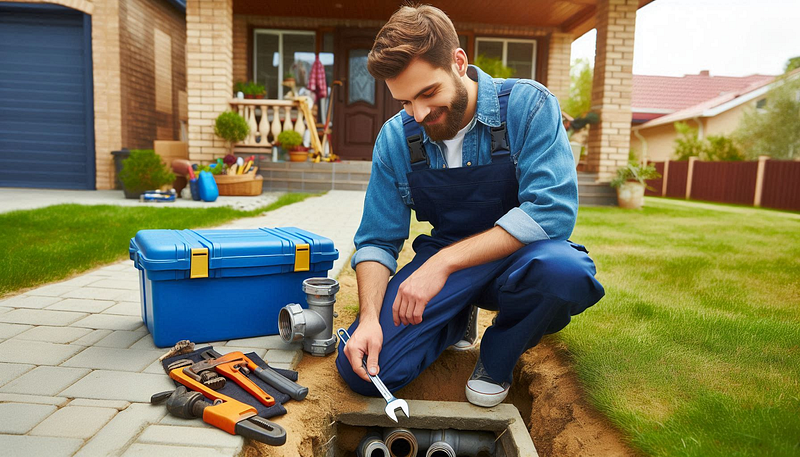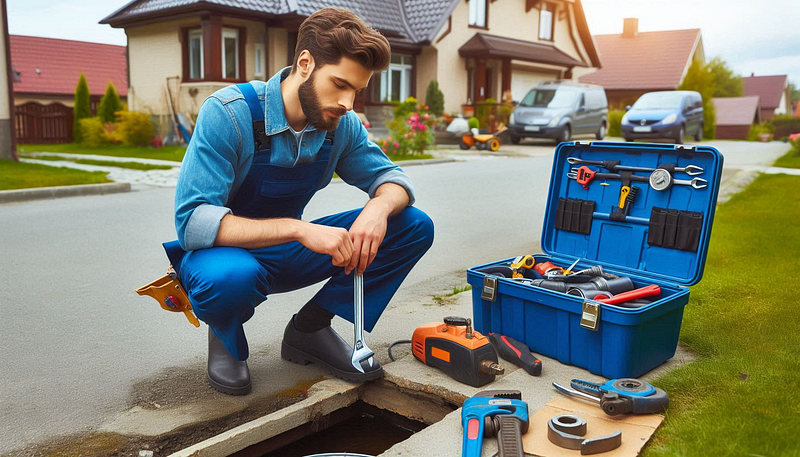
Ever stared into a bathtub overflowing with suds or heard the dreaded gurgle coming from your toilet? Clogged drains are a household nightmare, but fear not! By becoming a drain detective, you can identify the usual suspects behind these blockages and keep your plumbing flowing freely. This guide dives into the most common causes of clogged drains, along with some simple yet effective ways to prevent them. With a little planning and some handy tricks, you can transform into a drain master in your own home, saving time, money, and avoiding a full-blown plumbing predicament!
The Usual Suspects: Unveiling the Clog Culprits
The Greasy Gang: Think twice before you pour that leftover cooking oil or grease straight down the drain. As these cool and solidify, they cling to the insides of your pipes like a stubborn guest who just won’t leave. This greasy build-up can then trap other debris, creating a nasty clog that can bring your entire drainage system to a standstill.

How to Fight Back: Instead, let these greasy foes solidify in a container before tossing them in the bin. You can also regularly pour a pot of hot water down the drain to melt any lingering grease. Imagine it as a warm eviction notice for the unwanted guests in your pipes!
The Food Fighters: Tiny food scraps might seem harmless, but they can build up in your pipes, creating a dam for even larger pieces. Coffee grounds, eggshells, vegetable peelings — these seemingly innocent kitchen waste products can wreak havoc on your drainage system, causing slow-moving drains and potential blockages.
How to Outsmart Them: It’s a simple solution! Invest in a good quality drain strainer for your sink. This acts like a net, catching food scraps before they enter the drain and preventing them from causing problems further down the line. Additionally, dispose of food scraps in the bin, not the drain. Remember, your garbage disposal isn’t a magic portal — it’s meant for small bits, not whole meals!
The Hairy Situation: Shedding is a natural part of life, but hair can become a real headache for your drains. It can clump together inside the pipes, trapping soap scum and other debris, forming a formidable clog. This is especially true for shower and bathroom sink drains, where hair tends to accumulate more readily.
How to Manage the Mane: Drain unblocking guards are your best friend in the battle against hair clogs. These handy devices catch hair before it enters the drain, preventing it from causing problems further down the line. Additionally, regularly cleaning your drains with a drain snake or a natural cleaning solution (like baking soda and vinegar) can help remove any hair that’s already snuck through. Think of it as giving your drains a good combing to keep things flowing smoothly.
The Mineral Menace: Hard water, packed with minerals like calcium and magnesium, can leave behind deposits in your pipes. Over time, this build-up can narrow the passage and lead to slow drainage or even complete blockages. It’s like a gradual hardening of the arteries in your plumbing system!
How to Tame the Minerals: If you live in a hard water area, consider installing a water softener for your home. This appliance will remove the minerals from your water supply, preventing them from wreaking havoc on your pipes. By softening the water, you’re essentially keeping your plumbing system healthy and preventing future blockages.
The Wipe Out: Those handy disposable wipes may seem convenient, but they’re not designed for your plumbing system. Unlike toilet paper, wipes don’t break down easily and can clump together, causing some serious blockages. They’re more like stubborn guests who refuse to leave and end up causing a mess!
How to Wipe Out the Problem: The solution is simple: keep wipes out of your drains! Dispose of them in the bin, not the toilet. It might seem like a small change, but it can make a big difference in the health of your plumbing system.
Bonus Tip: The Mighty Plunger! Every household should have a trusty plunger on hand. This simple tool can often dislodge minor clogs without the need for harsh chemicals or expensive call-outs. It’s like having a superhero in your cleaning cabinet, ready to save the day from a cloggy disaster!
Pre-Planned Drain Maintenance: A Stitch in Time Saves Nine
While preventative measures can’t guarantee a clog-free future, they can significantly reduce the risk. Here are some tips for keeping your drains healthy and preventing future plumbing predicaments:

- Regular Cleaning: Once a month, pour a mixture of baking soda and vinegar down your drains. This fizzy concoction can help break down soap scum and grease build-up, acting like a natural drain cleaner. Imagine it as a gentle internal shower for your pipes! Let the mixture sit for about 15 minutes, then flush with hot water.
- Hot Water Flush: Every few weeks, flush your drains with hot water. This can help melt any lingering grease and keep things flowing smoothly. Think of it as a hot water rinse for your pipes, clearing away any greasy residue that could lead to future clogs.
- Be Tree-Wise: If you have large trees near your house, be mindful of their root systems. Roots can infiltrate pipes, causing blockages and major headaches. Consider planting trees a safe distance away from your drains, giving them plenty of space to grow without interfering with your plumbing system.
Drain Unblocking: When DIY Doesn’t Cut It
If your preventative measures haven’t solved the problem and your drains are still sluggish, it’s time to call in a professional drain unblocking service. Experienced plumbers have the expertise and tools to diagnose and tackle even the most stubborn clogs. They’re like drain detectives, able to identify the culprit and get your plumbing system flowing freely once again.
Don’t wait until you’re knee-deep in suds! If you suspect a clog, but it’s not a complete blockage, consider trying some of the DIY methods mentioned above. However, for persistent clogs or complex plumbing issues, it’s always best to call in a professional. They can not only clear the blockage but also identify the underlying cause to prevent future problems.
Remember: By understanding the common causes of clogged drains and taking preventative steps, you can save yourself time, money, and a whole lot of frustration. So, keep these tips in mind, and let your drains flow freely! With a little knowledge and some proactive drain maintenance, you can become a drain master in your own home and avoid a plumbing predicament altogether.

.jfif)
